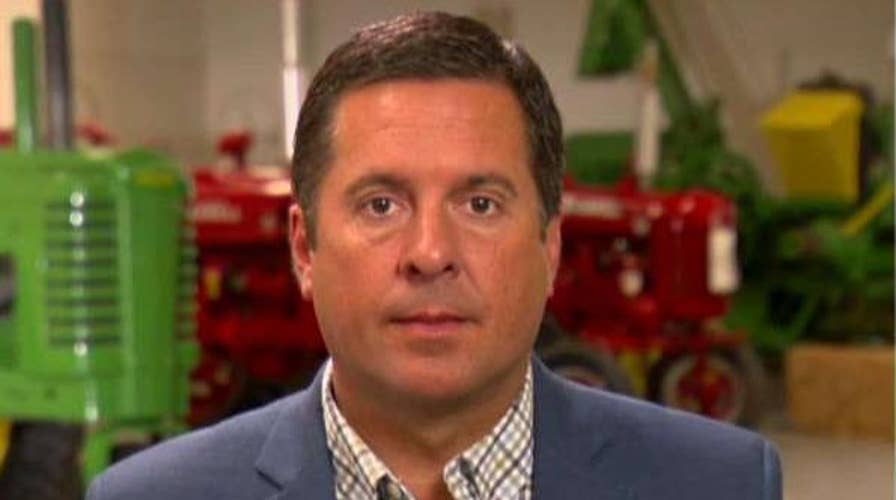Rep. Devin Nunes on James Comey memo revelations, investigation into origins of the Russia probe
New documents reveal that the FBI retrieved several memos from James Comey, including a secret one that the fired FBI director drafted the night before agents arrived; reaction from California Congressman Devin Nunes, ranking members of the House Intelligence Committee.
Isn’t it ironic that the hysteria related to Russia potentially hacking our election system has been totally created by American politicians?
If this is indeed an existential threat to our democracy, why aren’t our leaders simply suggesting that we return to the good old-fashioned lever machines or paper ballots (without the scan) that were totally reliable, far cheaper than their electronic counterparts, and totally immune to hacking?
Let’s recall what prompted this dumb effort to create a solution for a problem that didn’t exist. It was the 2000 presidential election and the controversy over "hanging chads" in Broward County, Fla. sparked a frenzy among officials who needed to show they would do something to ensure this fiasco never happened again.
Talk about an overreaction! The very easy solution would’ve been to junk the ridiculous butterfly ballot that they employed in that Florida county. Instead, Congress passed the Help America Vote Act (HAVA), which led us down a needless path of spending billions of dollars to “upgrade” each state’s voting infrastructure with electronic voting machines.
As a New Yorker who had been voting on lever machines since my 18th birthday, I never faced a problem casting a ballot, and the integrity of an election was never a question.
As the old saying goes: "If it ain’t broke, don’t fix it."
Bit elected officials concluded they had to fix our election system anyway, and decided high-tech was the way to go.
A cottage industry of electronic voting machine manufacturers swooped in on every state capitol, with ample campaign contributions in tow. Before you knew it, it wasn’t a question of whether states would purchase these machines, but which bells-and-whistles version they would choose.
About a decade ago, New York state passed legislation requiring each of its 62 counties to purchase electronic machines. Residents were taxed hundreds of millions of dollars to help subsidize the procurement.
But other costs ensued. In Suffolk County we were forced to spend over $1 million in the depths of the recession to build a wing on our elections building because the machines had to be stored in a climate-controlled setting.
More from Opinion
CLICK HERE TO GET THE OPINION NEWSLETTER
We were so outraged we sued the state to prevent it from forcing us to ditch our reliable lever machines in lieu of the electronic version. Our argument didn't center just on costs. We also raised the fact that we would all rue the day we went electric because of the potential exposure to hacking.
Why would we jeopardize the integrity of our electoral process for no valid reason? Anyway, we lost. And so did the American public.
Electronic machines were not enough for the tech set. Online voting would revolutionize the franchise, they said. Amazingly, 32 states to this day permit some form of online balloting, despite warnings the systems are not secure.
An analysis by Silicon Valley executives warned that "potential criminal electronic attacks on computer software, such as destructive 'viruses' or 'Trojan Horse' software, create a serious threat to Internet voting."
In 2004, the Pentagon canceled a proposed Internet voting program for overseas military personnel due concerns about hacking.
And in 2010, a University of Michigan professor answered a challenge made by the Board of Elections in Washington, D.C., which was testing a new Internet voting device in a mock election. The professor hacked it within 36 hours.
Meanwhile, some in our free-spending Congress seek to pay homage to former Special Counsel Robert Mueller's warning of future hacking attempts by calling for the spending of $750 million over the next two years to protect the voting system infrastructure and require paper ballots to accompany the electronically scanned votes.
CLICK HERE TO GET THE FOX NEWS APP
Instead, they should go back to the old-fashioned lever or paper systems that were never broken in the first place, and toss the electronics into the ash pit of failed experiments.
Perhaps those hundreds of millions of dollars would be better spent dealing with the homeless camping out on the streets of our major cities.









































